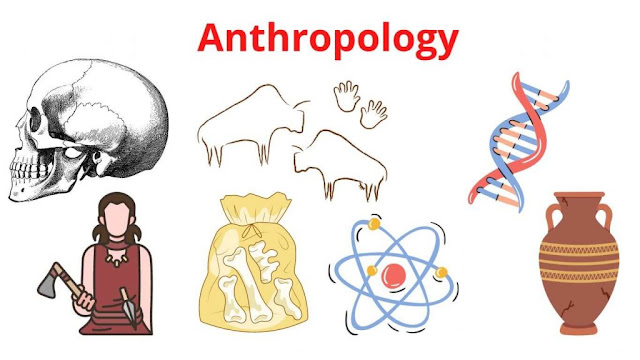 |
| Anthropology Course in india |
The term Anthropology has been derived from two Greek terms namely ‘anthropos’ which means human and ‘logos’ means study. Thus Anthropology is the study of human beings in its absoluteness.
(toc)
Anthropology is a science, which studies the origin and the physical, social and cultural development and behavior of mankind, especially various human cultures, human civilizations, their traditions and customs. It not only studies the biological evolution of human beings and the socio-cultural linguistic development of humans, but also their physical and cultural diversity at different ages, places and environments. Anthropology is about people, their relationships, and how they live together as members of society. It contributes to the understanding and explanation of socio-cultural behaviour. Anthropologists study human societies worldwide with reference to kinship, political organisation, religion, legal system, economy, language, education, health care and art, in other words people’s lifestyle or culture. Thus social problems like birth control, labor unrest, juvenile delinquency, mortality rate can be dealt with the help of information gathered from anthropological studies. Anthropology involves archaeological study of human relics to know the biological and cultural history of the human species over the last four million years, the cultural patterns of people from around the world down to even those who happen to live next door to you, and the techniques and ideas people have used both to exploit and protect natural resources and the environment.
To know the origin and physical, cultural, and social development of human beings, Anthropologists as social scientists study the language, traditions, beliefs, possessions, and values of people in various parts of the world and formulate hypotheses to explain their research and findings. They examine, analyze, report on, and compare different cultures and how they grow, develop, and interact. Anthropology is best suited for candidates who have deep interest in history and who love to travel to various places of historic importance.
There are several branches of anthropology that deals with various aspects of human development. These include the following:
Physical or Biological Anthropology – This branch deals with the biological evolution of human beings and linkage of humans with their primate ancestors. Differences between various races, human genetics, and adaptations to various climatic conditions also come under this branch. Researchers in this field can study human evolution, physical variations between modern human populations, forensic anthropology, osteology, and a variety of related topics.
Anthropology : Eligibility & Course Areas
Educational:
Generally anyone having completed their schooling in the science stream is eligible to study anthropology in college. To be a professional Anthropologist one has to qualify B.Sc in Anthropology. The minimum qualification for B.Sc in Anthropology is 10+2 pass with science subjects. For better career prospects one can pursue M.Sc in Anthropology for which the minimum qualification is B.Sc in the concerned subject, and further one can take up M.Phil and PhD in anthropology. Some universities or collages also offer B.A and M.A courses in Anthropology respectively into which, a 10+2 pass student with social science can be enrolled.
.A/B.Sc and M.A/M.Sc courses in Anthropology are offered by almost all major universities in India. These include Universities of Kolkata, Delhi, Allahabad, Vidyasagar, Utkal, Dibrugarh, Punjab etc.
Personal Attributes:
An Anthropologist needs to be prepared for physical hard work (traveling, excavating etc.) He or she should also be open-minded and unbiased. This quality is of utmost importance as a biased person will not be able to derive the right conclusions from their research and study. An anthropologist will be required to write down his or her findings; so some skill in the written language is also necessary. Anthropologists should be able to communicate well, develop and maintain good interpersonal relations with people from all communities and be patient and tactful, especially when interviewing people and gathering information.
Socio-cultural Anthropology – This branch deals with the socio cultural developments of human race from their origin. It involves the study of human cultures and societies, and it encompasses topics like linguistics, studies of minority populations, studies of social norms, and studies of specific types of social groups. Different methods of forming communities, difference in culture of various clans, cross cultural communication and such other topics form the subject of study under this branch. Cultural anthropologists are particularly well suited to work in professions involving people, such as teaching, law, medicine, social work, and journalism.
Prehistoric Anthropology – This branch can also be called archeology as it deals with bones, relics and artifacts dug up and tries to reconstruct the chronological sequence of history on the basis of these findings. It focuses on the reconstruction of early history and per-historic social customs. Anthropologists with specialisation in pre-historic anthropology are the most sought after people by museums, art houses, archeological organisations and archives where they work as historians, museum curators etc.
Applied Anthropology – Social problems like birth control, labor unrest, juvenile delinquency, mortality rate are dealt with the help of information gathered from other fields. This is the main job of this branch of Anthropology.
Linguistic Anthropology – It is the branch of anthropology that studies human through the languages that they use. Linguistic anthropology deals with subjects such as socio-linguistics. The origin and evolution of all written as well as unwritten languages and dialects are dealt with under this branch of anthropology. Linguistic anthropologists work as linguists.
Anthropology : Job Prospects & Career Options
Being the study of mankind as a whole, Anthropology is a very interesting subject. It opens many doors of knowledge to the biological, socio-cultural, prehistoric and every other aspect of human development. The job prospects for students of Anthropology are vast within India as well as abroad. Anthropology as a subject has far better scope in countries in the west, where they are hired in the field of medicine, law, business and other professional institutions. They are absorbed in community development programs and public service programs as well.
Anthropology as a subject offers great career prospects for those students who wish to pursue it at a higher level. There are many fields where Anthropologists can find employment. The three main areas of employment are in teaching, research and working in museums.
If one is planning on an academic career, then one can either find Academic jobs at various universities and institutes or do research. The scope for being a research scholar always remains open. Research students of Anthropology can easily find jobs in various international development and non-governmental organizations. Anthropological Survey of India is foremost among such organisations which employ anthropologists for research jobs. Anthropologists are involved extensively with field work and research. The field work can be both physically and mentally exhaustive and involve working in locations with low comfort levels.
The demand for curators by museums gives another opening for Anthropologists. They are employed by museums, art galleries, libraries and archives.
Other than these jobs one can opt for jobs with NGOs working in underdeveloped areas. Anthropologists can be hired by organizations like the UNESCO (United Nations Educational, Scientific and Cultural Organization , UNICEF (United Nations Children’s Fund ) and WHO (World Health Organisation). Many organizations like the ICMR (Indian Council of Medical Research) and the Police Department also offer employment to anthropologists for the purpose of crime detection. Other than such jobs, one can also find employment in the Human Resource Development sector of corporate houses, as anthropologists can balance the relation between society and industry. The scope for employment is varied – One can find employment as archaeologists, curators, linguists, social workers, tour guides as well as in publishing houses, social service organisations, forensic science and criminal investigation departments.






